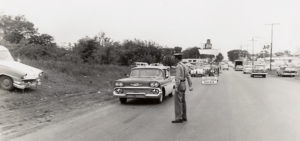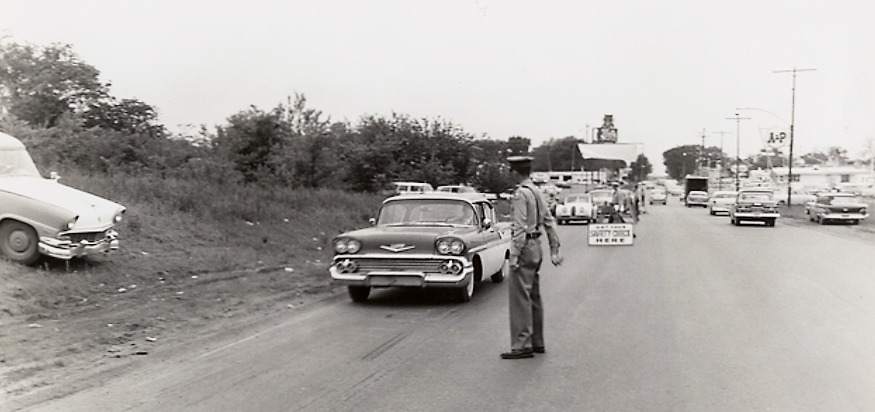DUI SOBRIETY CHECKPOINTS

Are Sobriety Checkpoints Legal?
The Supreme Court has held that sobriety checkpoints, like border checkpoints, are legal under certain circumstances.[i] However, sobriety or DUI checkpoints are seizures, and thus must comport with Fourth Amendment strictures. Dragnets, or police roadblocks set up to find anything that “looks suspicious” are illegal. In contrast, a sobriety checkpoint is set up specifically to deter motorists from impaired driving. The California Supreme Court has developed an 8-factor test to determine whether a sobriety checkpoint is legal:[ii]
-Did the police command personnel decide the location and procedures for the DUI checkpoint?
-Was there a neutral formula for determining which cars were stopped at the sobriety checkpoint? (every 4th car, for example)
-Was the DUI checkpoint maintained safely, with adequate road signs, signals, and lighting?
-Was the sobriety checkpoint located “on roads having a high incidence of alcohol related accidents and/or arrests?”
-Was the time and duration of the DUI checkpoint reasonable?
-Was it apparent to drivers that the DUI checkpoint was official and authorized, and did they have an opportunity to turn off from the DUI checkpoint?
-Did the sobriety checkpoint minimize the average time each motorist was detained?
-Was there advance notice to the public of the time and location of the checkpoint?
In a misdemeanor or felony DUI involving a sobriety checkpoint, the prosecutor must provide some evidence that supports each of the eight factors above. As a practical matter, police checkpoints have been used for financial gain and racial profiling.[iii][iv] The state and federal government funds many Los Angeles DUI checkpoints.[v] A police agency receiving traffic safety grants must conduct “high-visibility enforcement efforts,” which include sobriety checkpoints and saturation patrols.[vi]
What Are Your Rights at a DUI Checkpoint?
Most Los Angeles DUI checkpoints will be visible to drivers, giving you an opportunity to take a route that avoids the checkpoint. However, if you enter the checkpoint, you must stop[vii] and submit to inspection. Your rights during a sobriety checkpoint are like those during any other traffic stop. If the police ask for your license or registration, you must provide those documents. You may refuse to answer police questions during the sobriety checkpoint. While the police may have a right to stop you, they do not have the right to forcibly interrogate you. It is unlawful for the officers to question motorists about things that are not related to the purpose of the checkpoint.[viii] You also have the right to refuse to perform field sobriety tests. You do not have to give officers permission to a search at a DUI checkpoint. You have the right to refuse to blow into the roadside handheld PAS (Preliminary Alcohol Screening) Device. However, under the California implied consent law[ix], if you are arrested for a DUI, you must consent to blood-alcohol chemical testing. You also have the right to ask the arresting officer to give you a chemical test of your blood or breath if you are arrested for a DUI.[x]
Where Are Police Checkpoints Tonight?
Most California police departments send out press releases in advance of their DUI checkpoint. Local newspapers, neighborhood websites (patch, nextdoor for e.g.), and services like nixle will provide advance notice of sobriety checkpoint locations. You can also go to each police department’s website under “news” or “press releases” to find DUI checkpoint locations. For example, the LAPD publicizes Los Angeles sobriety checkpoints at lapdonline.org/newsrooms
If you have been arrested at a DUI checkpoint, or if you are facing criminal charges arising from police conduct at or near a sobriety checkpoint, contact the Los Angeles and Pasadena DUI lawyers at THE LEVENTHAL FIRM. Our experienced criminal defense lawyers have represented many clients detained at Los Angeles and Pasadena DUI checkpoints, and we know how to analyze the actions of police at a Los Angeles sobriety checkpoint. Our lawyers will challenge the prosecution to prove that the sobriety checkpoint was legal; if they cannot, we fight for your misdemeanor or felony DUI to be dismissed.
[i] Michigan State Police Dept. v. Sitz (1990) 496 U.S. 444
[ii] Ingersoll v. Palmer (1987) 43 Cal.3d 1321
[iii] http://californiawatch.org/public-safety/car-seizures-dui-checkpoints-prove-profitable-cities-raise-legal-questions
[iv] In an effort to prevent racial profiling, California Government Code 12525.5 requires police to report data on all traffic stops, beginning April 1, 2019 for large police agencies. Police are to report the “perceived race or ethnicity, gender, and approximate age of the person stopped.”
[v] For a list of grant recipients, amounts, and conditions of the grant, see the OTS annual Highway Safety Plan publication. 2016 HSP can be found here: http://www.ots.ca.gov/Media_and_Research/Publications_and_Reports/hsp16/2016_HIGHWAY_SAFETY_PLAN.pdf
[vi] CFR 1300.23
[vii] VC 2814.2(a)
[viii] People v Valenzuela (1994) 28 CA4th 817, 826
[ix] VC 23612
[x] VC 23612(d)(1)


